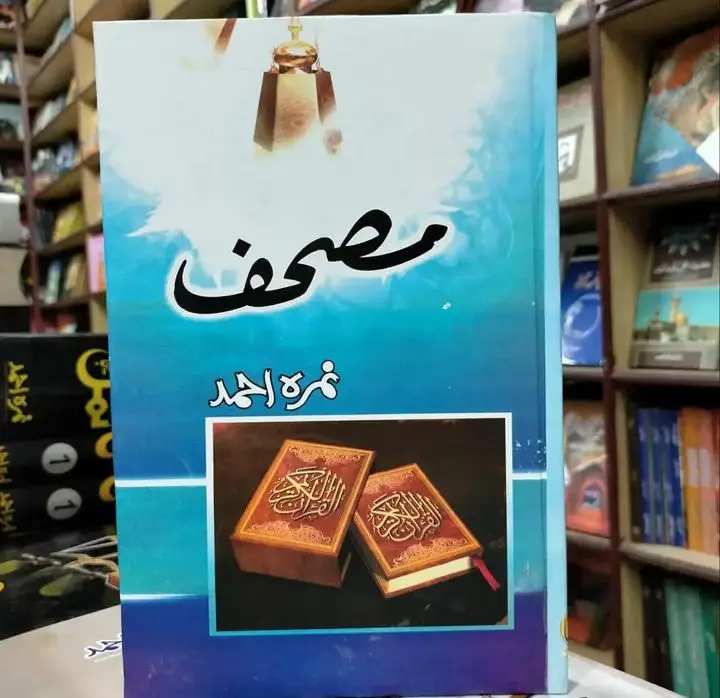Introduction
“Mushaf” is a celebrated Urdu novel written by the talented author Nimra Ahmed. Renowned for her unique storytelling and ability to weave spirituality with everyday life, Nimra Ahmed has created a literary work that resonates deeply with readers. “Mushaf” is a profound narrative that explores themes of faith, destiny, and the transformative power of the Quran, through the life and journey of its protagonist, Mehmal Ibrahim.
This essay provides an in-depth analysis of “Mushaf,” delving into its plot, characters, themes, and cultural context. It also examines Nimra Ahmed’s narrative techniques and the novel’s impact on readers and Urdu literature.
Plot Summary
“Mushaf” follows the life of Mehmal Ibrahim, a young girl who faces numerous personal and social challenges. Orphaned at a young age, Mehmal lives with her indifferent relatives who treat her poorly. She feels lonely and despondent, grappling with life’s injustices and hardships. Her life changes dramatically when she discovers a copy of the Quran, referred to as the “Mushaf,” which she finds wrapped in a beautiful velvet cover.
Mehmal Ibrahim: The Protagonist
Mehmal Ibrahim is depicted as a resilient yet troubled young woman. The novel begins by portraying her struggles with loneliness, financial difficulties, and a lack of familial support. Mehmal’s character is a representation of many individuals who feel lost and seek solace. Her journey towards spiritual awakening and understanding is the crux of the novel, demonstrating the impact of the Mushaf on her life.
The Mushaf
The Mushaf, or the Quran, serves as the central symbol and catalyst in the narrative. As Mehmal begins to read and understand the Quran, she experiences a profound transformation. The Mushaf becomes a source of guidance, solace, and enlightenment for Mehmal, helping her navigate through her challenges and find purpose in her life.
Themes and Motifs
- Faith and Spiritual AwakeningThe primary theme of “Mushaf” is the transformative power of faith. Mehmal’s journey from despair to spiritual enlightenment underscores the impact of the Quran on an individual’s life. The novel portrays faith as a source of strength and guidance, capable of providing solace and direction in times of hardship.
- Destiny and Divine Intervention“Mushaf” explores the concept of destiny and the belief that divine intervention can alter the course of one’s life. Mehmal’s discovery of the Mushaf and the subsequent impact it has on her life highlight the idea that fate is guided by a higher power. The novel suggests that the Quran holds answers and guidance for those who seek it with a sincere heart.
- Resilience and Personal GrowthMehmal’s character development throughout the novel emphasizes the theme of resilience. Despite facing numerous challenges, she finds the strength to persevere and grow through her faith. The novel underscores the importance of inner strength and the ability to overcome adversity through spiritual guidance.
- Family and RelationshipsThe novel also delves into the complexities of family dynamics and relationships. Mehmal’s strained relationship with her relatives and her quest for belonging and acceptance are pivotal aspects of the narrative. “Mushaf” highlights the importance of compassion, understanding, and support within familial relationships, and how faith can help mend and strengthen these bonds.

Mushaf Novel By Nimra Ahmad-pdf-Download-(pantherbolt.com)
Character Analysis
- Mehmal IbrahimMehmal is a multi-dimensional character whose journey is central to the narrative. Her transformation from a troubled and despondent girl to a spiritually enlightened individual is portrayed with depth and sensitivity. Mehmal’s struggles and triumphs make her a relatable and inspiring character, embodying the novel’s themes of faith and resilience.
- Supporting CharactersThe supporting characters in “Mushaf” contribute to the richness of the narrative. Mehmal’s relatives, friends, and other individuals she encounters each play significant roles in her journey. Their interactions with Mehmal provide insight into various societal and familial dynamics, enriching the story’s thematic complexity. Characters such as Faris, Taimoor, and Mehmal’s aunt add depth to the narrative, highlighting different facets of human nature and relationships.
Literary Style and Techniques
Nimra Ahmed’s writing in “Mushaf” is characterized by its emotional depth and eloquent prose. Her narrative style combines realism with spiritual and mystical elements, creating a compelling and immersive reading experience. Ahmed’s use of symbolism and metaphors enhances the thematic richness of the novel, while her realistic dialogue and character development add authenticity to the story.
Cultural and Social Context
“Mushaf” is set within the cultural and social framework of contemporary Pakistani society. The novel addresses various issues, including social inequality, family dynamics, and the role of faith in everyday life. Through its characters and their experiences, “Mushaf” offers a nuanced portrayal of Pakistani culture and social norms.
Critical Reception
“Mushaf” has been widely praised by readers and critics alike for its profound themes and compelling narrative. The novel’s exploration of faith, destiny, and personal growth has resonated with readers, making it a significant work in Urdu literature. Critics have lauded Nimra Ahmed’s ability to address complex spiritual and societal issues while crafting an engaging and emotionally resonant story.
Impact and Legacy
The impact of “Mushaf” extends beyond its literary success. The novel has inspired discussions on faith, spirituality, and personal transformation, encouraging readers to reflect on their own beliefs and experiences. Its success has also paved the way for more works that explore similar themes, highlighting the importance of faith and spirituality in literature.
Conclusion
“Mushaf” is a remarkable novel that offers a profound exploration of faith, destiny, and personal growth. Nimra Ahmed’s skillful storytelling and deep understanding of human emotions make the novel a compelling and thought-provoking read. Through Mehmal’s journey, readers are encouraged to reflect on their own spiritual paths and the transformative power of faith.
In conclusion, “Mushaf” is not just a novel; it is a spiritual and emotional journey that resonates deeply with readers. Nimra Ahmed has created a literary masterpiece that continues to inspire and captivate audiences, ensuring its place as a significant work in contemporary Urdu literature.

